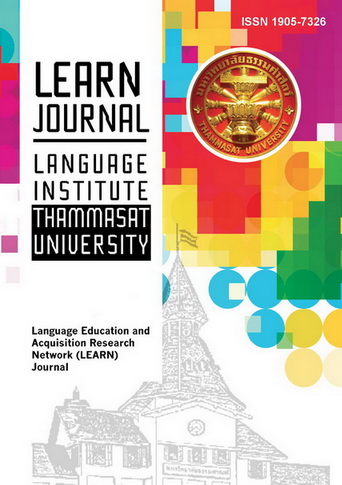“I’m Going to Remember this Audition for a Long, Long Time!”: Simon Cowell’s Compliments on Spectacular Performances on America’s Got Talent and Britain’s Got Talent
Main Article Content
Abstract
Most studies on talent competition shows (e.g., Culpeper & Holmes, 2013; Garces-Conejos Blitvich et al., 2013; Tang, 2016) do not delve into the role of judges giving positive comments to contestants. This paper investigates Simon Cowell’s compliments given to Golden Buzzer winners on America’s Got Talent (henceforth AGT) and Britain’s Got Talent (henceforth BGT) between 2016 and 2020. Apart from the studies on compliments being scarce, the existing coding schemes are not fine-grained. This paper improves the coding schemes. Moreover, previous studies on compliments (e.g., Chen & Rau, 2015; Lin, 2020) compared judges’ pragmatic variations cross-culturally, but none of them compared the pragmatic variations of an individual judge. This paper then explores Cowell’s pragmatic variations while serving as a judge on AGT and BGT over the last five years. Data was collected from Golden-Buzzer winning auditions uploaded on YouTube. Cowell’s compliments were transcribed and later analyzed according to the modified coding schemes. Results show that there were some pragmatic variations in Cowell’s use of compliments. He used a greater number of explicit compliment strategies and more explicit compliment sub-strategies on AGT. Such pragmatic variations, however, are small, and there are marked similarities.
Article Details
References
Boyle, R. (2000). ‘You’ve worked with Elizabeth Taylor!’: Phatic functions and implicit compliments. Applied Linguistics, 21(1), 26−46. https://doi.org/10.1093/applin/21.1.26
Brown, P., & Levinson, S. (1987). Politeness: Some universals in language usage. Cambridge University Press.
Chen, Y. L., & Rau, V. (2015). Compliments and criticisms given by judges on a singing competition series in Taiwan. Study English Language Literature, 35, 1−19.
Cohen, A. (1996). Developing the ability to perform speech acts. Studies in Second Language Acquisition, 18(2), 253−267.
Culpeper, J., & Holmes, O. (2013). (Im)politeness and exploitative TV in Britain and North America: The X Factor and American Idol. In N. Lorenzo-Dus & P. Garces-Conejos Blitvich (Eds.), Real Talk: Reality television and discourse analysis in action (pp. 169−198). Palgrave Macmillan. https://doi.org/10.1057/9781137313461_9
Danziger, R. (2018). Compliments and compliment responses in Israeli Hebrew: Hebrew university in Jerusalem students in interaction. Journal of Pragmatics, 124, 73−87. https://doi.org/10.1016/j.pragma.2017.12.004
Garces-Conejos Blitvich, P., Bou-Franch, P., & Lorenzo-Dus, N. (2013). Reality television: a discourse-analytical perspective. In N. Lorenzo-Dus & P. Garces-Conejos Blitvich (Eds.), Real talk: Reality television and discourse analysis in action (pp. 9−23). Palgrave Macmillan. https://doi.org/10.1057/9781137313461_2
Herbert, R. (1990). Sex-based differences in compliment behavior. Language in Society, 19(2), 201−224. https://doi.org/10.1017/S0047404500014378
Holmes, J. (1988). Paying compliments: A sex-preferential politeness strategies. Journal of Pragmatics, 12(4), 445−465. https://doi.org/10.1016/0378-2166(88)90005-7
Holmes, J. (1995). What a lovely tie! Compliments and positive politeness strategies. In J. Holmes (Ed.), Women, men and politeness (pp. 115−153). Routledge. https://doi.org/10.4324/9781315845722
Holmes, S. (2004). Reality goes pop!: Reality TV, popular music, and narratives of stardom in Pop Idol. Television and New Media, 5, 147−172. https://doi.org/10.1177/1527476403255833
Kasper, G., & Dahl, M. (1991). Research methods in interlanguage pragmatics. Studies in Second Language Acquisition, 13, 215−247. http://dx.doi.org/10.1017/S0272263100009955
Lewandowska-Tomaszczyk, B. (1989). Praising and complimenting. In W. Oleksy (Ed.), Contrastive pragmatics (pp. 73−100). John Benjamins. https://doi.org/10.1075/pbns.3.08lew
Lin, C. Y. (2020). Exploring judges’ compliments and criticisms on American, British and Taiwanese shows. Journal of Pragmatics, 160, 44−59. https://doi.org/10.1016/j.pragma.2020.02.008
Lin, C. Y., Woodfield, H., & Ren, W. (2012). Compliments in Taiwan and Mainland Chinese: The influence of region and compliment topic. Journal of Pragmatics, 44, 1486−1502. https://doi.org/10.1016/j.pragma.2012.06.012
Lorenzo-Dus, N., Bou-Franch, P., & Garces-Conejos Blitvich, P. (2013). Impoliteness in US/UK talent shows: A diachronic study of the evolution of a genre. In N. Lorenzo-Dus & P. Garces-Conejos Blitvich (Eds.), Real Talk. Reality Television and Discourse Analysis in Action (pp. 199−217). Palgrave Macmillan. https://doi.org/10.1057/9781137313461_10
Maiz-Arevalo, C. (2012). “Was that a compliment?” Implicit compliments in English and Spanish. Journal of Pragmatics, 44, 980−996. https://doi.org/10.1016/j.pragma.2012.04.004
Masuda, K. (2016). Style-shifting in student-professor conversations. Journal of Pragmatics, 101, 101−117. https://doi.org/10.1016/j.pragma.2016.05.012
Rees-Miller, J. (2011). Compliments revisited: Contemporary compliments and genders. Journal of Pragmatics, 43(11), 2673−2688. https://doi.org/10.1016/j.pragma.2011.04.014
Sakirgil, C. & Cubukcu, H. (2013). Formulas and topics in Turkish and English compliments. Journal of Pragmatics, 70, 1126−1135. https://doi.org/10.1016/j.sbspro.2013.01.168
Tang, C. (2016). Managing criticisms in US-based and Taiwan-based reality talent contests: A cross-linguistic comparison. Pragmatics, 26(1), 111−136. https://doi.org/10.1075/prag.26.1.06tan
Wang, Y., & Tsai, P. (2003). An empirical study on compliments and compliment responses in Taiwan Mandarin conversation. Studies in English Literature and Linguistics, 29(3), 118−156. https://doi.org/10.6241/concentric.ling.200306_29(2).0005
Yaguchi, M., Iyeiri, Y. & Baba, Y. (2010). Speech style and gender distinctions in the use of very and real/really: An analysis of the Corpus of Spoken Professional American English. Journal of Pragmatics, 42(3), 585−597. https://doi.org/10.1016/j.pragma.2009.08.002


